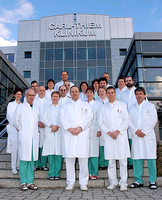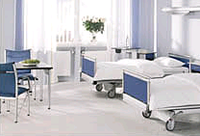

There are about 2000 acute care hospitals in Germany. They differ by sponsorship and by service level.
Sponsorship responsibility can be with:
As to service level, German state laws mostly regulate four types of hospitals:

Medical procedures will be up to current state of the art at all levels, The university clinics will offer treatment at the forefront of medical research, but they will not always accept all patients. The central service hospitals - ”Schwerpunktkrankenhäuser” - will usually offer similar medical standards but be more easily accessible
Regarding the leadership responsibility, the medical departments or clinics are usually headed by one, sometimes more than one chairman who is employed of the hospital. Alternatively, medical responsibility can also be in the hands of one or more practitioners or voucher physicians, who are self-employed, running their own private practice and treating patients in hospital on special contract basis.
For most German patients, the cost of hospital treatment is taken care of by the compulsory general social security health insurance. In some cases, these insurances will also assume the treatment costs for foreign patients, especially in emergency cases, but this has to be investigated in detail and depends on inter-government contracts.
Patients who are not members of the social security health scheme generally have to pay their own bills and it is their own responsibility whether their private insurance will actually refund the costs. Foreign patients are generally considered to belong to this group when they are admitted into a hospital for voluntary (i.e. non-emergency) treatment.
The chairmen of clinics mostly have the license to treat such self-paying patients as private patients and invoice their services directly. Thus, these patients receive several bills: One from the hospital and one or more – if other physicians were involved, like the radiologist, the surgeon, the laboratory physician – from the physicians who were medically responsible for the treatment.
Not everybody knows however, that there is no need to contract these costly services if you want to economize on the costs: If you do not opt for the additional private physician care, you will be served by the other senior and junior residents in the team, like the majority of the patients and with usually no less success.
Voucher physicians also invoice their services directly, for treatment in their practice as well as in the hospital. In these cases the hospital bill is somewhat reduced as the hospital did not render any physician services.
German hospitals frequently have the double-bed-room as regular standard. In these hospitals, additional payment may only be asked for accommodation in a single-bed room. If, however, the hospital has 3 or more beds-per-room wards as regular standard, an additional charge will also be invoiced for double-bed accommodation. These surcharges were regulated some years ago and now generally range around 80.-€ - 100.-€ per night for the single-bed, 50.-€ - 70.-€ for accommodation in the double-bed room. This also, is not a compulsory cost factor: You can opt for the additional comfort and pay the price - or share the room with one or two other patients, depending on the hospital you choose.

For the hospital services, i.e. medical treatment, nursing care and accommodation, a new pricing system has been introduced by federal legislation in the beginning of 2004. A general catalogue of about 900 DRGs (diagnosis related groups) provides fixed overall prices which may not differ dramatically between hospitals. A complete list of these DRGs would exceed the scope of this article, but it is possible to get rough cost estimates from hospitals based on the known diagnoses.
One speciality of the German health system is the well developed rehabilitation sector: Separate clinics continue the treatment of patients after the acute phase and, with the help of special procedures and facilities, e. g. physical therapy, ensure the best-possible outcome of medical procedures. This follow-up treatment must be booked separately, and a normal stay of about 21 days will incur another sum of 2500.- to 3000.-€
During the stay in a hospital, the costs of using the telephone, and internet access (which is being offered by more and more hospitals), will be charged separately according to consumption, the use of the mostly available TV is frequently included.
German medical students have to pass primarily scientific basic study before they are admitted to the clinical part of their university courses. After the medical approbation examination (usually after 5 years), a phase of 5 to 7 years as assistant or resident physician ensues, before the young physician can pass the specialization examination as senior resident for one of the clinical fields. During this time, a clearly defined catalogue of diagnostic or operative procedures must be fulfilled (like a certain number of the most important operations for a surgeon–to-be), and after passing this additional examination, the specialized consultant can either pursue his profession in a hospital, or as self-employed physician in private practice.

Training for the nursing profession is fixed at three years. It has to follow a government-prescribed curriculum, is offered by schools which stand under state supervision and provides theoretical education as well as on the job training. The examination is also state controlled. After a number of years in their job, nurses can acquire additional special certificates, e.g. as operation- nurse, anaesthetics-nurse or nurse-in-charge of a ward etc. These courses usually take another 2 years of in-service training.
Quality management is currently being introduced in all hospitals in Germany following pertinent legislation. In addition, for a number of years, compulsory quality surveillance programmes have been in force for certain frequent hospital procedures, and these data are being evaluated under government regulation. Increasing numbers of German hospitals are undergoing different quality management procedures, getting certified under the DIN-ISO, EFQM, KTQ, Procum-Cert or Joint Commission quality management schemes.
-----------------------------------------------------------------
This article was adapted from the site of German Hospital Service Ltd., a patient referral company working with different hospitals, usually in the north of Germany. In the website www.german-hospital-service.com and in the blog http://germanhospitalservice.blogspot.com, the author, Johann W. von Krause, offers a host of additional information about hospital treatment for foreigners in Germany.